City gardens, public produce stands ease 'food desert' woes
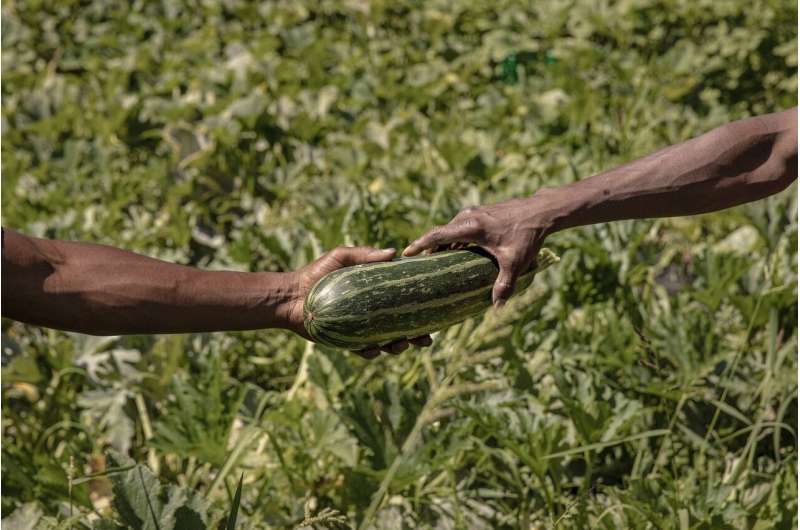
On his way home, Darnell Eleby paused before boarding the commuter train in Atlanta's Five Points station and maneuvered his wheelchair to a stop not seen on many mass transit platforms: a fresh food stand stocked with colorful fruits and vegetables. Aided by a volunteer, he filled a basket with bananas, apples, corn and squash and paid with a health program voucher.
"It helps you out when you can't get to the store," Eleby said.
In Chicago, nonprofit groups have opened health clinics where staff provide patients with nutrition education and free coupons to area farmers markets replete with healthy foods. Both cities also have encouraged burgeoning efforts to plant urban gardens.
Large cities across the country are using this multipronged approach to bring healthy diets to "food deserts," mostly low-income neighborhoods located miles away from the nearest supermarket. They hope not only to reduce rates of diabetes, high blood pressure and obesity, but to encourage community activism and empowerment.
"We're doing this out of ... responsibility toward our community," Safia Rashid said of the garden she and her husband, Kamau Rashid, have tended on Chicago's South Side for the past 14 years.
The 44-year-old mother said the couple began gardening when their oldest son was 3 years old, to fight "'food apartheid' ... folks deliberately disinvesting in this community, removing healthy food away from us," Safia Rashid said.

The Rashids' garden grows at the South Chicago Farm, a 14-acre (5.6-hectare) site developed in 2015. It's one of eight such farms in Chicago operated by the nonprofit Urban Growers Collective.
In Atlanta, many of the tomatoes, peaches and peppers found in bins at the Fresh MARTA Markets come from food grown in the city and nearby farms, said Hilary King, of the nonprofit Community Farmers Markets, which partners with the Metropolitan Atlanta Rapid Transit Authority to run the stands. Launched in 2015, the MARTA markets are located at different stations during the week.
"We cannot rely on traditional retail methods," said Atlanta urban agriculture director Mario Cambardella.
Nonprofits also have teamed up with ridesharing company Lyft to provide up to 300 low-income families with discounted rides to farmers markets and grocery stores in Atlanta. The six-month pilot program, called Access AgLanta, began June 1, inspired by a similar Lyft partnership in Washington, D.C.
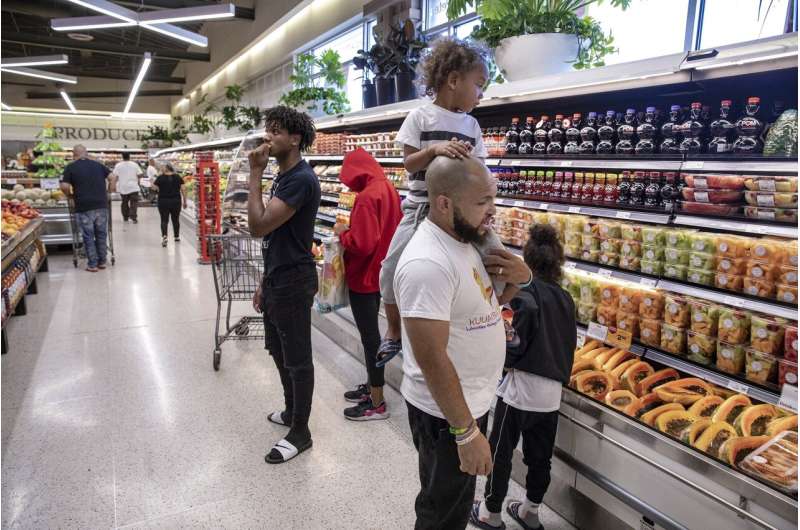
"What we have often heard over the years is that transportation is a huge barrier to food access," said Alysa Moore, program manager for Georgia Fresh For Less, which provides state residents who receive food stamps with financial assistance to shop at farmers markets.
Eleby relies heavily on the transit platform markets. Without them, he said, he'd be forced to rely on a small scattering of stores in his low-income neighborhood in southwest Atlanta where he said he has to smell food or examine it for mold before buying it. The food there, he said, isn't "like it's supposed to be."
As of 2015, roughly 22% of Atlanta's population was living in a low-income community more than a mile from a food store, according to the U.S. Department of Agriculture.
In Chicago, that number is 5%. Comparatively, the number in Seattle is 7.8%; Washington, D.C., 6.4%; Baltimore, 4.3%; and Milwaukee, 3.5%, according to the USDA.
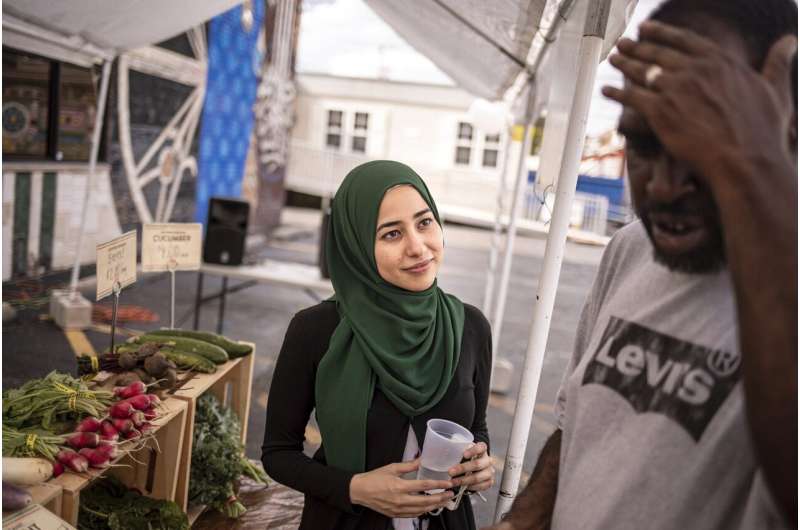
Christopher "Mad Dog" Thomas, 34, who grew up in the Altgeld Gardens neighborhood on Chicago's South Side, said he has suffered from "'food desert eating disorder,' where all you can afford to eat is candy."
Thomas and his wife, Kathryn Gatewood, make a weekly trip outside their neighborhood to a store called Pete's Supermarket, which Kathryn Gatewood describes as "the black or Hispanic Whole Foods."
"We spend almost 40% of our paychecks combined to ensure a healthier diet for our kids," she said, adding that it is a better alternative than buying bad food from the "dusty shelves" of corner stores in Englewood.
The Chicago nonprofit Inner-City Muslim Action Network has launched "The Corner Store Campaign" to change that.
Sami Defalla, who runs the Morgan Mini Mart in Englewood, has been an active partner with the campaign for more than two years. Defalla has created a "green zone" in the store where shoppers can purchase inexpensive fresh fruits and vegetables.
-
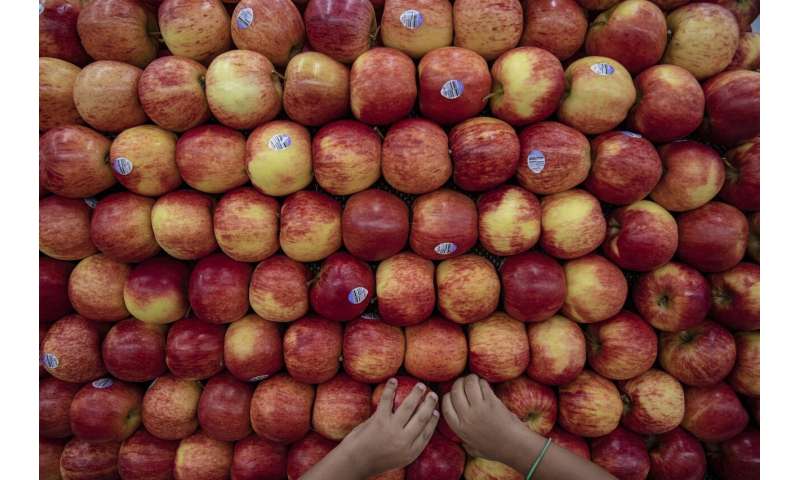
In this Thursday, Aug. 15, 2019, photo, Rian Gatewood-Hillestad plays with apples while shopping with his parents at Pete's Market in Chicago's Garfield Neighborhood. Christopher "Mad Dog" Thomas, Rian's father, organizes a weekly family trip outside their neighborhood to Pete's Supermarket, which his wife describes as "the black or Hispanic Whole Foods." (AP Photo/Amr Alfiky) -
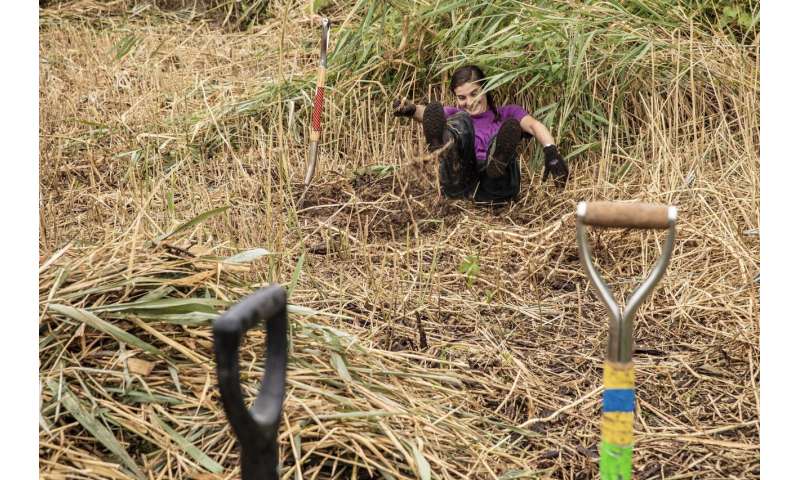
In this Saturday, Aug. 17, 2019, photo, Viviana Gentry Fernandez-Pellon, co-founder of Cooperation Operation, smiles as she falls on her back while working to clear section of high weeds and brush to create a new space for an organic produce garden in the Pullman neighborhood of Chicago. Large cities across the country are using a multi-pronged approach to bring healthy diets to "food deserts," mostly low-income neighborhoods located miles away from the nearest supermarket. They hope not only to reduce rates of diabetes, high blood pressure and obesity, but to encourage community activism and empowerment. (AP Photo/Amr Alfiky) -
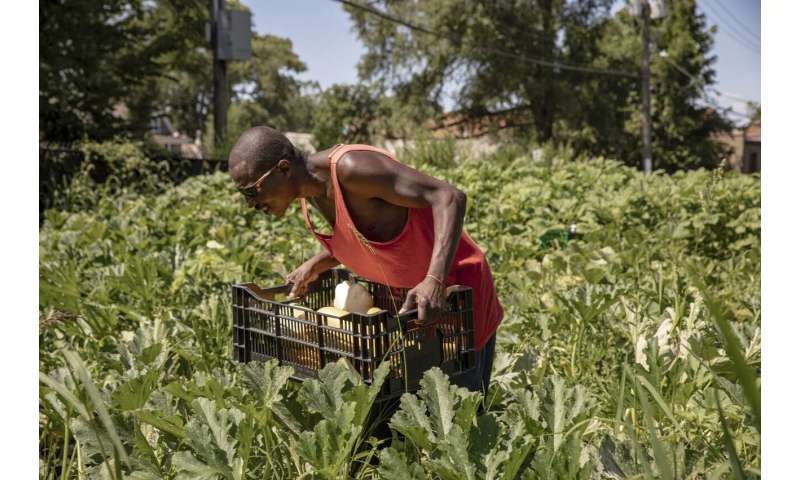
In this Friday, Aug. 9, 2019, photo, Stanford Williams works at the Growing Home, Inc. farm in Chicago's Englewood neighborhood. Large cities across the country are using a multi-pronged approach to bring healthy diets to "food deserts," mostly low-income neighborhoods located miles away from the nearest supermarket. They hope not only to reduce rates of diabetes, high blood pressure and obesity, but to encourage community activism and empowerment. (AP Photo/Amr Alfiky) -
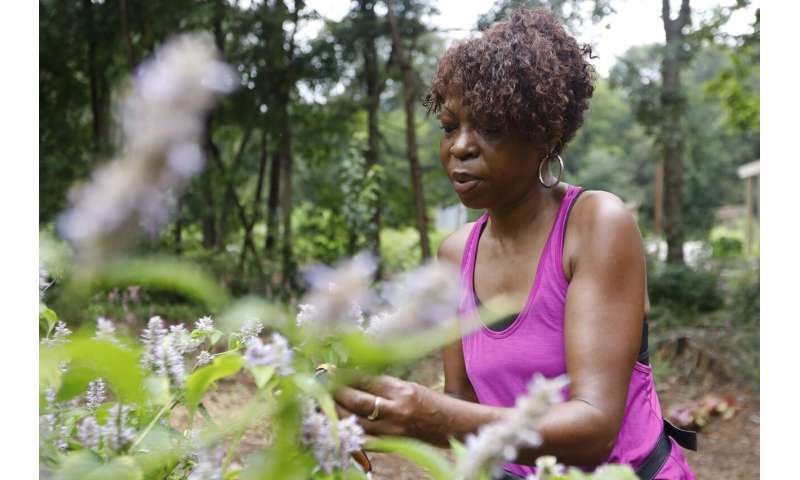
In this Friday, July 19, 2019 photo, Celeste Lomax harvests anise hyssop plants in a community garden at the Urban Food Forest at Browns Mill in Atlanta. Lomax lives in a low-income neighborhood in south Atlanta with limited access to healthy food. She said the community gardens provide an alternative food source for volunteers and neighborhood residents. (AP Photo/Andrea Smith) -
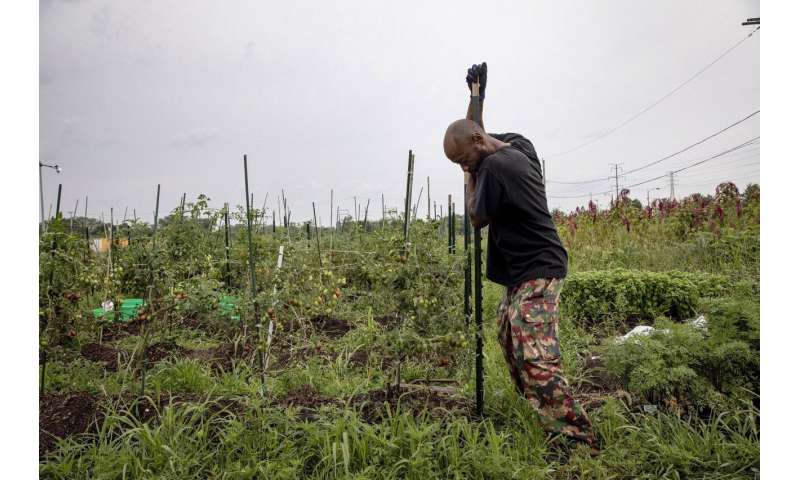
In this Tuesday, Aug. 20, 2019, photo, Kamau Rashid works in his garden in the South Chicago Farm on Chicago's south side. Rashid and his wife Safia, started urban farming almost 14 years ago, when their oldest son was 3 years old. "We're doing this out of us feeling the need and responsibility toward our community." Safia Rashid, said. Living in a neighborhood with little access to healthy foods, so-called food deserts, they set out to fight what they called "food apartheid." (AP Photo/Amr Alfiky) -
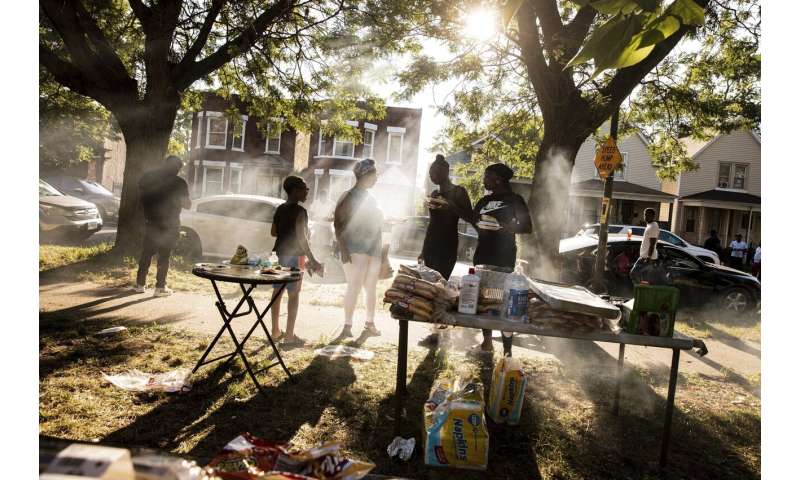
In this Thursday, Aug. 1, 2019, photo, people gather for a barbecue in a vacant lot hosted by Inner-city Muslim Action Network's (IMAN) in Chicago's neighborhood of West Englewood. IMAN seeks to educated people on proper nutrition in a section of the city with low access to nutritional foods. (AP Photo/Amr Alfiky) -
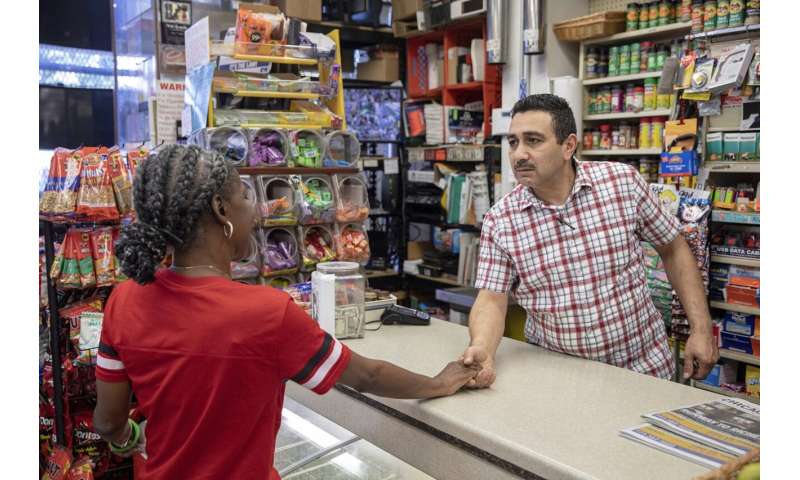
In this Monday, Aug. 19, 2019, photo, Sami Deffala, owner of the Morgan Mini Mart in Chicago's Englewood neighborhood, right, offers his condolences to a customer who lost her 17-year-old son recently to gun violence in Ohio. Sami Defalla, who runs the small Mart in Englewood, has been an active partner with the campaign for more than two years. Defalla has created a "green zone" in the store where shoppers can purchase inexpensive fresh fruits and vegetables. (AP Photo/Amr Alfiky) -
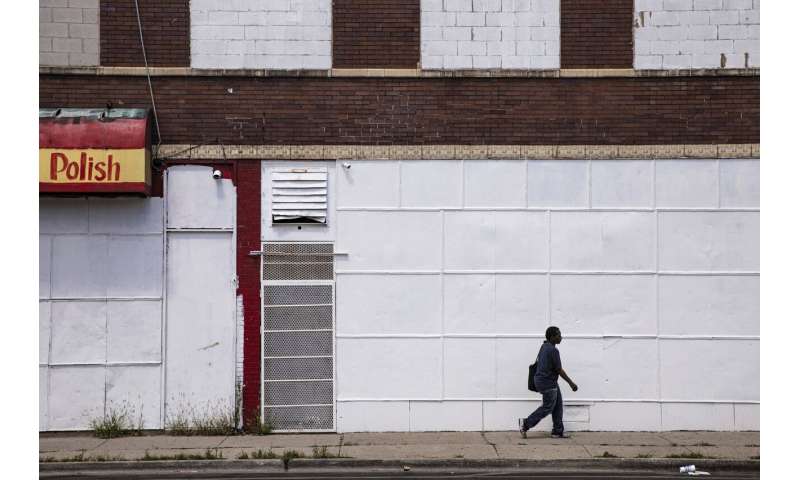
In this Friday, Aug. 9, 2019, photo, a man walks on a sidewalk past boarded up business in Chicago's Englewood neighborhood. As of 2015, roughly 22% of Atlanta's population was living in a low-income community more than a mile from a food store, and in Chicago, that number is 5%, according to the U.S. Department of Agriculture. (AP Photo/Amr Alfiky) -
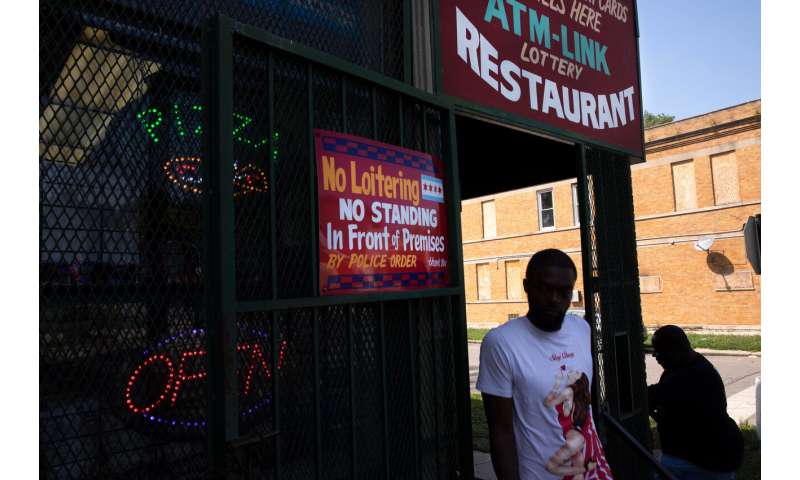
In this Monday, Aug. 19, 2019, photo, two people pass though the doorway of the Morgan Mini Mart in Chicago's Englewood neighborhood. Sami Defalla, who runs the Morgan Mini Mart in Englewood, has been an active partner with the campaign for more than two years. Defalla has created a "green zone" in the store where shoppers can purchase inexpensive fresh fruits and vegetables. (AP Photo/Amr Alfiky) -
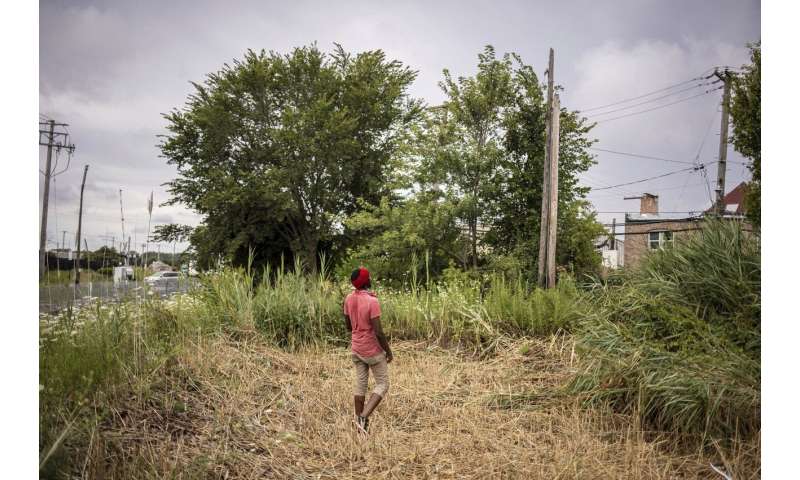
In this Saturday, Aug. 17, 2019, photo, Olisaemeka Okakpu walks into a section of public land consisting of high weeds and brush, that his organization Cooperation Operation plan to clear for an organic produce garden in the Pullman neighborhood of Chicago. (AP Photo/Amr Alfiky) -
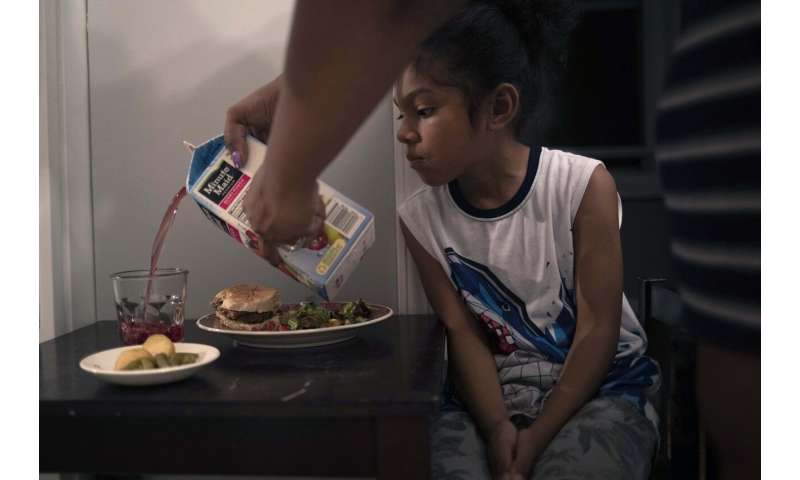
In this Thursday, Aug. 15, 2019, photo, Kathryn Gatewood pours juice into a glass for her son, Tracy at their home in Chicago's Englewood Neighborhood. "We spend almost 40% of our paychecks combined to ensure a healthier diet for our kids," she said, adding that it is a better alternative than buying bad food from the "dusty shelves" of corner stores in Englewood. (AP Photo/Amr Alfiky) -
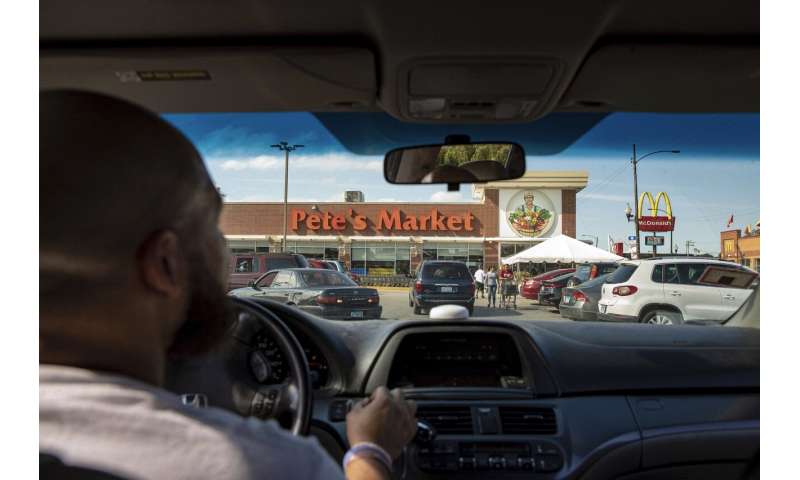
In this Thursday, Aug.15, 2019, photo, Christopher "Mad Dog" Thomas, drives into Pete's Market in Chicago's Garfield Neighborhood. Thomas organizes a weekly family trip outside their neighborhood to the store, which his wife describes as "the black or Hispanic Whole Foods." (AP Photo/Amr Alfiky) -
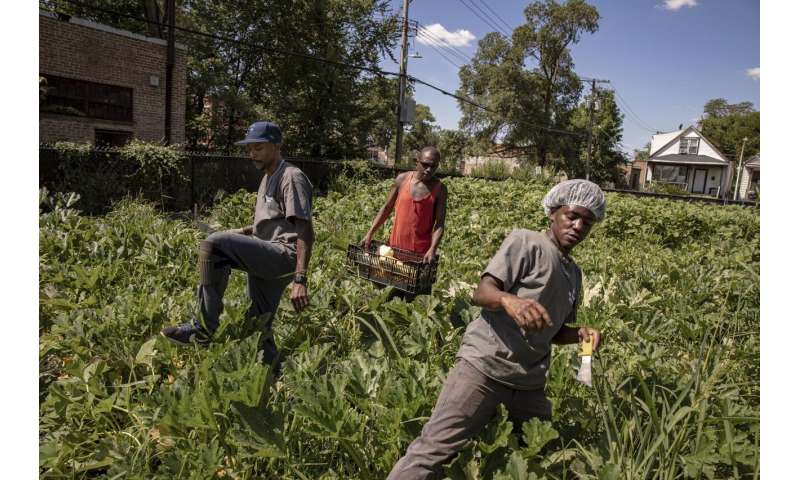
In this Friday, Aug. 9, 2019, photo, Maurice McCary, left, Stanford Williams, center and Torreyon Simmons, work at the Growing Home, Inc. farm in Chicago's Englewood neighborhood. Large cities across the country are using a multi-pronged approach to bring healthy diets to "food deserts," mostly low-income neighborhoods located miles away from the nearest supermarket. They hope not only to reduce rates of diabetes, high blood pressure and obesity, but to encourage community activism and empowerment. (AP Photo/Amr Alfiky) -

In this Thursday, Aug. 15, 2019, photo, Rian Gatewood-Hillestad reacts to cartoons printed on a cereal box while shopping with his parents at Pete's Market in Chicago's Garfield neighborhood. Christopher "Mad Dog" Thomas, Rian's father, organizes a weekly family trip outside their neighborhood to Pete's Supermarket, which his wife describes as "the black or Hispanic Whole Foods." (AP Photo/Amr Alfiky) -
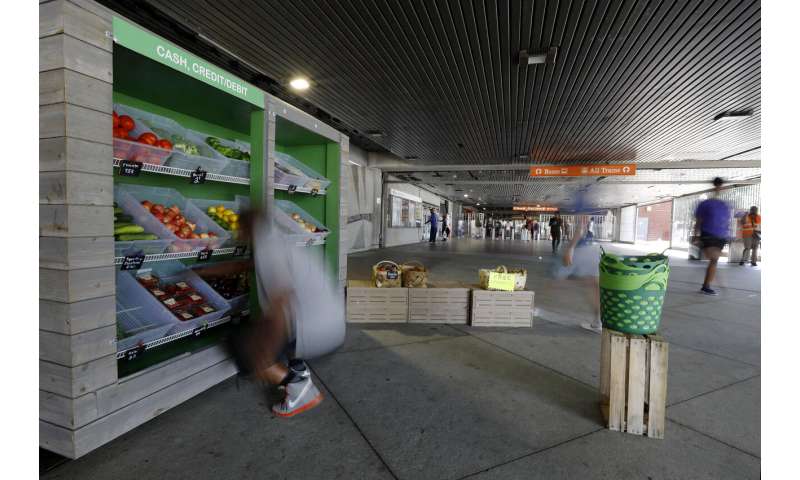
In this Tuesday, Aug. 20, 2019 photo, people pass by the Fresh MARTA Market in the West End transit station in Atlanta. The Metropolitan Atlanta Rapid Transit Authority and the Atlanta nonprofit Community Farmers Markets partner to run the stands, which sell food from some Atlanta urban farms. (AP Photo/Andrea Smith) -
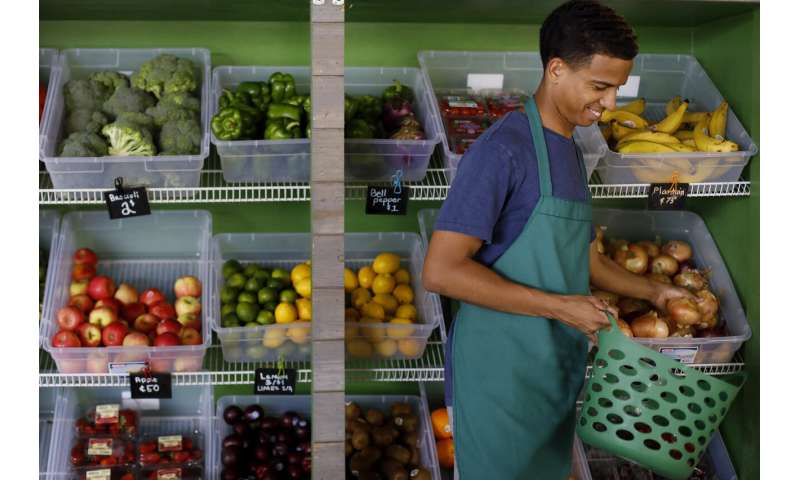
In this Tuesday, Aug. 20, 2019 photo, volunteer Xavier Lopez helps a customer select fruits and vegetables at the Fresh MARTA Market at the West End transit station in Atlanta. The Metropolitan Atlanta Rapid Transit Authority and the Atlanta nonprofit Community Farmers Markets partner to run the stands, which provide a healthy food source for people living in food deserts.(AP Photo/Andrea Smith) -
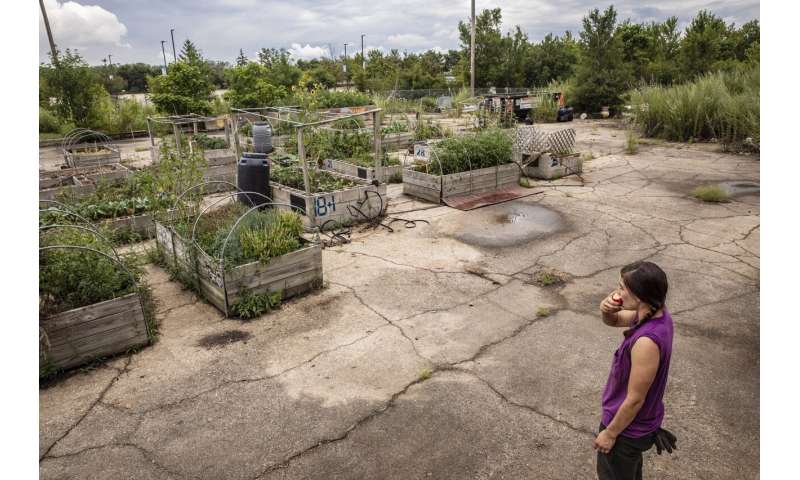
In this Saturday, Aug. 17, 2019, photo, Viviana Gentry Fernandez-Pellon, co-founder of Cooperation Operation, eats an apple as she looks over the successful urban community garden in Chicago's Pullman neighborhood. (AP Photo/Amr Alfiky)
"I wish I had a bigger platform to offer more ... to my customers," Deffala said.
The Muslim Action Network also operates a health clinic where patients can see a dietitian free of charge and receive coupons for free produce at the nearby farmers market. Every Friday, the group hosts a farmers market where residents can connect with local urban farmers.
As a volunteer in a community garden in Atlanta, Celeste Lomax is finally able to take fresh produce home to her low-income neighborhood, which is located about 4 miles (6.4 kilometers) away from the nearest supermarket.
"We have a right to eat healthy like everyone else does," she said.
© 2019 The Associated Press. All rights reserved.



















